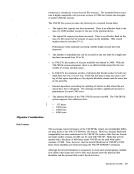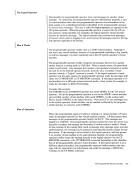Function/ SVC. No.
Macro Dec Hex Support
TASK INTERF.107 6B Provides macro interface support for system
information retrieval. The parameters supported
are:
GETFLD:
Field=ppsavar returns problem program
save area address.
=savar returns current save area
address.
=maintask returns main task TID in R 1.
=aclose return in R1 1 if in process,
o if not.
=pcexit returns the pcexit routine
address and save area inRO and R1 respectively. If the
exit routine is currently
active, bit0 in RO is set ON. If no exit is defined, it
returns a0 in both RO and
Rl.MODFLD: =vsamopen set bit X'08' in tab tabflags
byte if R1..,=0 =aclose set bit X' 10' in tab tab flags
byte if R1..,=0 The MODFLD requests for fields CNCLALL and OPENSV A are treated as a NOP with a return
code ofO. All other GETFLD/MODFLD requests as well as
all other SVC107 macro calls are unsupported.
The error message DMSGMF121S is issued and
the request cancelled. See note 2.
DATA SECURE108 6C Not supported, see note 2. PAGESTAT 109 6D Not supported, see note 2.
Figure 45 (Part 8 of 9).SVC Support Routines and Their Operation
VSE Support Under eMS 399
Macro Dec Hex Support
TASK INTERF.
information retrieval. The parameters supported
are:
GETFLD:
Field=ppsavar returns problem program
save area address.
=savar returns current save area
address.
=maintask returns main task TID in R 1.
=aclose return in R1 1 if in process,
o if not.
=pcexit returns the pcexit routine
address and save area in
exit routine is currently
active, bit
returns a
Rl.
byte if R1..,
byte if R1..,
code of
all other SVC
The error message DMSGMF121S is issued and
the request cancelled. See note 2.
DATA SECURE
Figure 45 (Part 8 of 9).
VSE Support Under eMS 399



































































































































































































































































































































































































































































































































































































































